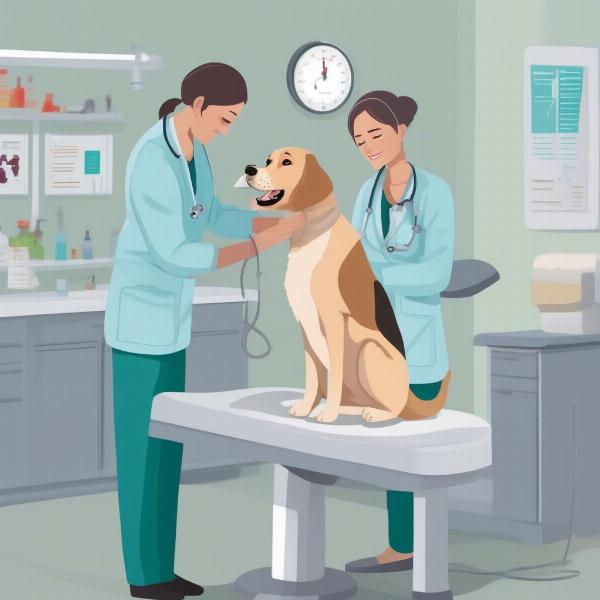Why does your dog nibble on blankets? This seemingly innocent behavior can stem from various reasons, ranging from simple comfort to underlying anxiety. Understanding the root cause is key to addressing it effectively and ensuring your furry friend’s well-being. This article will explore the common reasons behind blanket nibbling in dogs, offer practical solutions, and help you determine when it’s time to seek professional advice.
Why Does My Dog Nibble on Blankets?
Several factors can contribute to a dog’s blanket-nibbling habit. Sometimes, it’s a perfectly normal behavior, while other times, it can indicate an underlying issue. Let’s delve into the most common reasons:
Comfort and Security
Puppies, in particular, often nibble on blankets as a form of self-soothing, mimicking the comfort they received from nursing their mother. This behavior can persist into adulthood, especially in dogs who are anxious or stressed. The soft texture and familiar scent of a blanket can provide a sense of security and comfort.
Teething Puppies
For teething puppies, nibbling on blankets can provide relief from sore gums. The pressure and texture help to alleviate the discomfort associated with teething. It’s essential to provide appropriate chew toys during this phase to prevent destructive chewing on furniture and other household items.
Boredom and Lack of Stimulation
A dog who is bored or lacks sufficient mental and physical stimulation may resort to nibbling on blankets as a way to occupy themselves. This is especially true for dogs who are left alone for extended periods. Ensuring your dog gets enough exercise, playtime, and mental enrichment can significantly reduce this behavior.
Anxiety and Stress
Blanket nibbling can be a coping mechanism for dogs experiencing anxiety or stress. Separation anxiety, loud noises, changes in routine, or the introduction of a new pet can all trigger this behavior. Identifying and addressing the underlying cause of the anxiety is crucial to helping your dog feel more secure.
Medical Conditions
In some cases, blanket nibbling can be a symptom of an underlying medical condition, such as pica (a compulsion to eat non-food items) or dental problems. If the behavior is excessive or accompanied by other symptoms like vomiting or diarrhea, consult your veterinarian to rule out any medical issues.
How to Address Blanket Nibbling
Once you’ve identified the potential cause of your dog’s blanket nibbling, you can take steps to address it effectively:
Provide Appropriate Chew Toys
Offer a variety of safe and engaging chew toys to redirect your dog’s chewing behavior. Choose toys with different textures, sizes, and materials to keep your dog interested.
Increase Exercise and Mental Stimulation
Ensure your dog gets enough physical exercise and mental stimulation through walks, playtime, and interactive games. A tired and mentally engaged dog is less likely to resort to destructive behaviors.
Create a Calm and Enriching Environment
Provide a safe and comfortable space for your dog where they can relax and feel secure. This might include a cozy bed, familiar blankets, and access to their favorite toys.
Address Underlying Anxiety
If you suspect anxiety is the cause of the blanket nibbling, consult a veterinarian or a certified dog trainer or behaviorist. They can help you identify the triggers and develop a behavior modification plan to address the anxiety.
Rule Out Medical Conditions
If the behavior is excessive or accompanied by other symptoms, consult your veterinarian to rule out any underlying medical conditions.
When to Seek Professional Help
While occasional blanket nibbling is usually not a cause for concern, it’s essential to seek professional help if:
- The behavior is excessive or destructive.
- Your dog is ingesting large pieces of blanket material.
- The behavior is accompanied by other symptoms, such as vomiting, diarrhea, or changes in appetite.
- You suspect the behavior is related to anxiety or stress.
 Dog at Vet Checkup
Dog at Vet Checkup
Conclusion
Understanding why your dog nibbles on blankets is the first step towards addressing the behavior effectively. By providing appropriate chew toys, increasing exercise and mental stimulation, and addressing any underlying anxiety, you can help your furry friend develop healthy chewing habits and enjoy a happy and fulfilling life. Remember to consult a veterinarian or a certified dog trainer if you have any concerns or need further guidance.
FAQ
- Is blanket nibbling always a sign of a problem? No, occasional blanket nibbling can be a normal comfort-seeking behavior, especially in puppies.
- What kind of chew toys are best for dogs who nibble on blankets? Offer a variety of textures and materials, such as rope toys, rubber toys, and plush toys.
- How can I tell if my dog’s blanket nibbling is caused by anxiety? Look for other signs of anxiety, such as excessive panting, pacing, whining, or destructive behaviors.
- When should I contact my veterinarian about my dog’s blanket nibbling? If the behavior is excessive, destructive, or accompanied by other symptoms, consult your veterinarian.
- Can training help address blanket nibbling? Yes, a certified dog trainer can help you identify the underlying cause of the behavior and develop a behavior modification plan.
- What are some ways to enrich my dog’s environment and reduce boredom? Provide interactive toys, puzzles, and opportunities for social interaction.
- Is it safe to let my dog have access to blankets if they nibble on them? Supervise your dog and remove any blankets that are becoming frayed or damaged.
ILM Dog is your trusted source for expert advice on all aspects of dog care and well-being. From breed selection and health care to training and nutrition, we offer a wealth of resources to help you provide the best possible care for your canine companion. We specialize in breed selection, health and medical care, training and behaviour, nutrition and feeding, grooming, products and accessories. Contact us today for personalized guidance and support. Email: [email protected]. Phone: +44 20-3965-8624. Visit ILM Dog for more information.